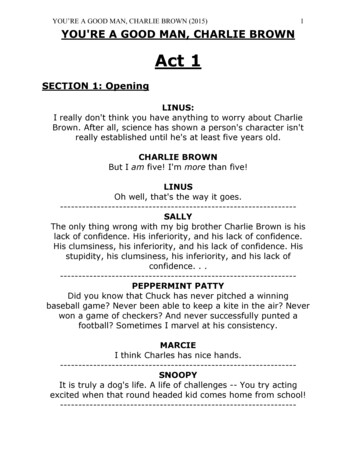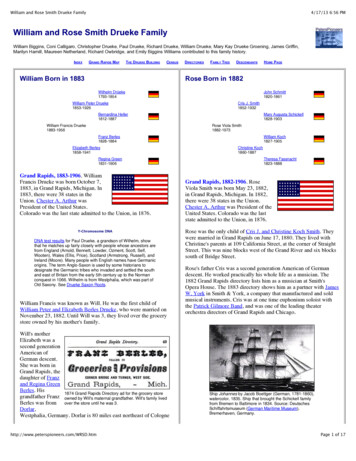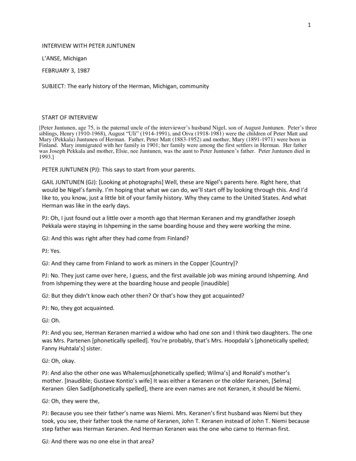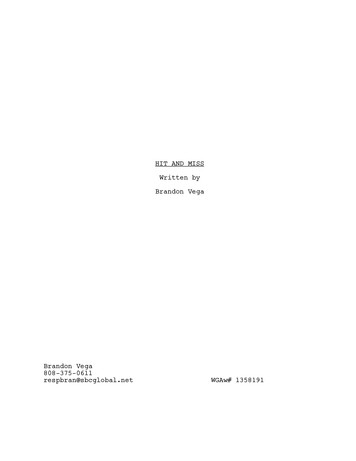
Transcription
The Best of Charlie Munger: 1994-2011A collection of speeches, essays, and Wesco annual meeting notes
October 2, 2012Dear fellow BRK shareholders,I am a faithful BRK shareholder living within reasonable driving distance to Omaha. Iusually drive up early morning of the BRK annual meeting, attend the meeting until 5pm,and drive back home the same day, just to save a few pennies. But I’ve been too cheapto pay for airfare and hotel rooms to attended Charlie Munger’s Wesco annual meetingsin Pasadena.When I heard that July 2011 would be the last meeting with Mr. Munger, I felt real regretfor never attending one in the past and was desperately searching for Wesco meetingnotes. When I contacted Mr. Whitney Tilson, he kindly emailed me not only his articlesand notes from the many Wesco annual meetings he’d attended, but also many otherrelevant materials from his archives, dating back to 1994. At his suggestion, I havecompiled them, along with some of the materials I’ve collected over time, into one filethat he can circulate to the BRK faithful and put on his website. I’m happy to do this as away to give back to the value investing community.I have set up a bookmarks system in the pdf file to ease your navigation, which you canaccess by clicking View, Navigation Panels, Bookmarks.If you have Wesco meeting notes prior to 1999 or any other materials that you think Ishould include, please email me and I will revise my compilation.SincerelyYanan Ma BledsoeBallwin, MOyananma@yahoo.com
Table of Contents2002 Tilson’s column: “Munger on Human Misjudgments”Page 51994 Munger on “The Psychology of Human Misjudgment”Page 91995 Munger’s speech at USC: “A Lesson on Elementary,Worldly Wisdom as it Relates to InvestmentManagement and Business”Page 361998 Munger on “Investment Practices of Leading CharitableFoundations”Page 721999 Munger’s “Master’s Class” on Foundation InvestingPage 772000 Munger’s speech to the Philanthropy Round TablePage 832001 Munger on “The Great Financial Scandal of 2003”Page 882004 Tilson’s column, “Munger Goes Mental”, on Munger’sSpeech at UC Santa BarbaraPage 962003 Munger’s speech at UC Santa Barbara: “AcademicEconomics: Strengths and Faults After ConsideringInterdisciplinary Needs”Page 1002009 Munger on “Sacrificing To Restore Market Confidence”Page 1252011 Munger’s “A Parody about the Great Recession”Page 1271999 Wesco meeting notesPage 1332000 Wesco meeting notesPage 1382001 Tilson’s column: “Charlie Munger Holds Court”Page 1462001 Wesco meeting notesPage 149
2002 Tilson’s column: “The Best of Charlie Munger”Page 1592002 Wesco meeting notesPage 1632003 Tilson’s column: “Charlie Munger’s Worldly Wisdom”Page 1732003 Wesco meeting notesPage 1772004 Wesco meeting notesPage 1932005 Wesco meeting notesPage 2162006 Wesco meeting notesPage 2462007 Wesco meeting notesPage 2742008 Wesco meeting notesPage 2962009 Wesco meeting notesPage 3112010 Wesco meeting notesPage 3222011 Wesco meeting notesPage 334
Munger on Human MisjudgmentsCharlie Munger gave an insightful speech on “24 Standard Causes of HumanMisjudgment,” which has powerful implications for investors. Whitney Tilson summarizessome key points and provides a link to the speech, so you can read for yourself.By Whitney TilsonPublished on the Motley Fool web site, 821.htm)Behavioral finance -- which examines how people’s emotions, biases, and misjudgments affecttheir investment decisions -- is one of the least discussed and understood areas of investing. Yet Ibelieve it’s critically important -- so important, in fact, that I covered it in my very first column(in September 1999, which seems like an investing lifetime ago, doesn’t it?).Behavioral finance recently reappeared on my radar screen when I came across an 80-minuterecording of a speech given by Berkshire Hathaway (NYSE: BRK.A) Vice Chairman CharlieMunger, Warren Buffett’s right-hand man and a genius in his own right. It’s a brilliant, powerful,and compelling tour de force.In it, Munger highlights what he calls “24 Standard Causes of Human Misjudgment,” and thengives numerous examples of how these mental weaknesses can combine to create “lollapalooza”effects, which can be very positive -- as in the case of Alcoholics Anonymous -- or frighteninglynegative, such as experiments in which average people end up brutalizing others.I’d like to highlight some of Munger’s most important lessons, especially as they relate toinvesting.Psychological denialMunger notes that sometimes “reality is too painful to bear, so you just distort it until it’sbearable.” I see this all the time among investors -- both professionals and average folks. Thinkof all the people who simply have no business picking stocks, such as the “bull market geniuses”of the late 1990s, whose portfolios have undoubtedly been obliterated in the bear market of thepast two and a half years.You’d think these people would’ve recognized by now that whatever investment success theyhad in the late ‘90s was due solely to one of the most massive bubbles in the history of stockmarkets, and that they should get out while they still have even a little bit of money left. I’m suresome are doing so, but many aren’t because they’d have to acknowledge some extremely painfultruths (e.g., they should not, and should never have been, picking stocks; they speculated withtheir retirement money and frittered most of it away, and so on).Instead, I’m still getting emails like this one, from people who, I suspect, are in seriouspsychological denial:-5-
Why isn’t anyone suggesting WorldCom as an investment possibility? AssumingWorldCom survives, and assuming they reach a third of their highest stock value prior tothe decline, why not buy shares at 0.19 (as listed now) [they’re now down to 0.124]and hold them for a few years? If WorldCom manages to make it back to 10.00 a share,the profit for a small investor would be more than satisfactory. What am I missing here?It seems like another chance to ‘get in on the ground floor.’The answer is that WorldCom equity is almost certain to be worthless, and the only sane peoplebuying the stock right now are short-sellers covering their very profitable shorts.Bias from consistency and commitment tendencyMunger explains this bias with the following analogy: “The human mind is a lot like the humanegg, and the human egg has a shut-off device. When one sperm gets in, it shuts down so the nextone can’t get in.” In other words, once people make a decision (to buy a stock, for example), thenit becomes extremely unlikely that they will reverse this decision, especially if they havepublicly committed to it.This is true even if overwhelming evidence emerges indicating the initial decision wasdisastrously wrong. Have you ever bought a stock such as Lucent, Enron, or WorldCom, seenyour original investment thesis torn to shreds by subsequent developments -- such that youwould never consider buying more of the stock (despite the lower price), yet you didn’t sell? I’vewritten two columns on this common, painful mistake.Over-influence by social proofHuman beings have a natural herding tendency -- to look at what everybody else is doing and dothe same, however insane that behavior might be. Munger gives a classic example fromcorporate America:Big-shot businessmen get into these waves of social proof. Do you remember some yearsago when one oil company bought a fertilizer company, and every other major oilcompany practically ran out and bought a fertilizer company? And there was no moredamned reason for all these oil companies to buy fertilizer companies, but they didn’tknow exactly what to do, and if Exxon was doing it, it was good enough for Mobil, andvice versa. I think they’re all gone now, but it was a total disaster.Similar behavior led to the tech stock bubble of the late 1990s. For more on this topic, see mycolumn The Cocktail-Party Test, in which I argue, “Following the crowd and investing in what isfashionable is a recipe for disaster. Instead, look for solid companies with strong balance sheetsthat are either out of favor with Wall Street or, better yet, not even on Wall Street’s radarscreen.”Other questions Munger answersI’ve cited only a few examples of Munger’s powerful observations and the answers he gives to arange of perplexing questions, such as:-6-
Why are boards of directors so consistently dysfunctional and unable to rein in even themost egregious behavior by CEOs?Why was the introduction of New Coke almost one of the costliest business blunders ofall time?Why didn’t Salomon’s CEO John Gutfreund or General Counsel Donald Feuersteinimmediately turn in rogue employee Paul Mozer -- a failure of judgment that cost bothmen their careers and nearly put Salomon out of business?How did Joe Jett lose 210 million for Kidder Peabody (and parent company GE)?How did Federal Express solve the problem of processing all of its packages overnight?Why wouldn’t Sam Walton let his purchasing agents accept even the tiniest gift from asalesperson?How does Johnson & Johnson ensure that it evaluates and learns from its experiencemaking acquisitions?How has Tupperware “made billions of dollars out of a few manipulative psychologicaltricks?”Why do bidders consistently overpay in “open-outcry” actions?Why is a cash register “a great moral instrument?”Why would it be evil not to fire an employee caught stealing?Why might raising the price of a product lead to greater sales?Why do some academicians continue to cling to the Efficient Market Theory?Why are people who grow up in terrible homes likely to marry badly? And why is it socommon for a terrible first marriage to be followed by an almost-as-bad secondmarriage?How can real estate brokers manipulate buyers?How do lotteries and slot machines prey on human psychology?Why should we be grateful that our founding fathers were “psychologically astute” insetting the rules of the U.S. Constitutional Convention?There is no space here to even begin to summarize Munger’s answers to these questions, so Itranscribed his speech and posted it here. I urge you to read it.-7-
If you find his thinking and the field of behavioral economics as fascinating as I do, I suggestreading Influence, by Robert Cialdini, Why Smart People Make Big Money Mistakes, by GaryBelsky and Thomas Gilovich and, for the definitive work on Munger himself, Damn Right!Behind the Scenes with Berkshire Hathaway Billionaire Charlie Munger, by Janet Lowe.Guest columnist Whitney Tilson is managing partner of Tilson Capital Partners, LLC, a NewYork City-based money management firm. He owned shares of Berkshire Hathaway at the timeof publication. Mr. Tilson appreciates your feedback at Tilson@Tilsonfunds.com. To read hisprevious columns for The Motley Fool and other writings, visit http://www.tilsonfunds.com. TheMotley Fool is investors writing for investors.-8-
-9-
-10-
-11-
-12-
-13-
-14-
-15-
-16-
-17-
-18-
-19-
-20-
-21-
-22-
-23-
-24-
-25-
-26-
-27-
-28-
-29-
-30-
-31-
-32-
-33-
-34-
-35-
WESCO FINANCIAL'S CHARLIE MUNGER"A LESSON ON ELEMENTARY, WORLDLY WISDOM AS IT RELATES TOINVESTMENT MANAGEMENT & BUSINESS."from a lecture to the students of Professor Guilford Babcock at the University of SouthernCalifornia Marshall School of Businessfrom Outstanding Investor Digest's May 5, 1995 EditionTABLE OF CONTENTS"A LESSON ON ELEMENTARY, WORLDLY WISDOMAS IT RELATES TO INVESTMENT MANAGEMENT & BUSINESS." . 1ALL TOO LITTLE WORLDLY WISDOMIS DELIVERED BY MODERN EDUCATION. . 2WITHOUT MODELS FROM MULTIPLE DISCIPLINES,YOU'LL FAIL IN BUSINESS AND IN LIFE. . 3YOU'RE GIVING A HUGE ADVANTAGE TO OTHERSIF YOU DON'T LEARN THIS SIMPLE TECHNIQUE. . 4NEXT, YOU HAVE TO KNOW ACCOUNTING- ALONG WITH ITS LIMITATIONS. . 5AN IRON RULE OF WORLDLY WISDOM:ALWAYS, ALWAYS, ALWAYS TELL PEOPLE WHY. . 6ENGINEERING HAS MORE THAN ITS SHARE OF MODELS.AND THEY'RE THE MOST RELIABLE ONES, AS WELL. . 7THE HUMAN MIND HAS ENORMOUS POWER,BUT IT ALSO HAS STANDARD MISFUNCTIONS. . 8ORGANISMS, PEOPLE & COMPANIES WHO SPECIALIZECAN GET TERRIBLY GOOD IN THEIR LITTLE NICHE. . 9AND THERE ARE OTHER ECONOMIES: GEOMETRIC,ADVERTISING, INFORMATION, EVEN PSYCHOLOGICAL. . 10THINGS TEND TOWARD WINNER TAKE ALL.THEREFORE, IT PAYS TO BE #1, #2 OR OUT. . 11HOWEVER, BIGGER ISN'T ALWAYS BETTER --36-
THERE ARE ALSO DISADVANTAGES OF SCALE. . 12A CASE STUDY IN ECONOMIES VS. DISECONOMIES- WAL-MART VERSUS SEARS, ROEBUCK. . 13A MODEL WE'VE HAD TROUBLE WITH ANTICIPATING COMPETITION AND ITS SIDE EFFECTS. . 14A FEW WORDS ON PATENTS,TRADEMARKS AND FRANCHISES. . 15A BASIC LESSON OFTEN FORGOTTEN:NEW TECHNOLOGY CAN KILL YOU. . 16THE NATIONAL CASH REGISTER MODELIS EXACTLY WHAT YOU'RE LOOKING FOR. . 17FIGURE OUT WHERE YOU HAVE AN EDGETHEN, PLAY THERE AND ONLY THERE. . 18TO A MAN WITH PROFICIENCY IN MATH,EFFICIENT MARKET THEORY LOOKS LIKE A NAIL. . 19BETTING ON HORSES AND PICKING STOCKSHAVE MORE THAN A LITTLE IN COMMON. . 20AS USUAL, IN HUMAN AFFAIRSWHAT WINS ARE INCENTIVES. . 21IF SECTOR ROTATION IS VERY LUCRATIVE,WE'VE NEVER SEEN THE EVIDENCE. . 22RICH OR POOR, IT'S GOOD TO HAVEA HUGE MARGIN OF SAFETY. . 23GRAHAM WASN'T TRYING TO PLAY OUR GAME- I.E., PAYING UP FOR BETTER BUSINESSES. . 24FROM THE VIEWPOINT OF A RATIONAL CLIENT,INVESTMENT MANAGEMENT TODAY IS BONKERS. . 25IF YOU DON'T LOAD UP ON GREAT OPPORTUNITIES,THEN YOU'RE MAKING A BIG MISTAKE. . 26MAKE A FEW GREAT INVESTMENTSAND SIT ON YOUR ASSETS. . 27-37-
AND THERE'S THE ULTIMATE NO-BRAINER- LIKE FINDING MONEY IN THE STREET. . 28MODELS FROM BERKSHIRE HATHAWAY INVESTMENTS:COKE, GILLETTE, GEICO & THE WASHINGTON POST . 29THE INVESTMENT MANAGEMENT BUSINESS:DON'T PRACTICE PSYCHOLOGICAL DENIAL . 30-------------------A particularly astute student of human nature - particularly insofar as it relates to business andinvesting - Charlie Munger's counsel is highly prized and relied upon by friend and partnerWarren Buffett. His insights are equally valued and sought after by more than a few OIDsubscribers and contributors (and editors).Therefore, we were very pleased to be allowed to sit in on Munger's lecture at the University ofSouthern California last year on "investment expertise as a subdivision of elementary, worldlywisdom" and very gratefully acknowledge his generous permission to share it with you.As always, we highly recommend a very careful reading (and re-reading) of his comments andinsights and hope that you find them as valuable as we do:ALL TOO LITTLE WORLDLY WISDOMIS DELIVERED BY MODERN ---------------------------------------To be a great stock picker, you need some general education.Charlie Munger: I'm going to play a minor trick on you today - because the subject of my talk isthe art of stock picking as a subdivision of the art of worldly wisdom. That enables me to starttalking about worldly wisdom - a much broader topic that interests me because I think all toolittle of it is delivered by modern educational systems, at least in an effective way.And therefore, the talk is sort of along the lines that some behaviorist psychologists callGrandma's rule - after the wisdom of Grandma when she said that you have to eat the carrotsbefore you get the dessert.The carrot part of this talk is about the general subject of worldly wisdom which is a pretty goodway to start. After all, the theory of modern education is that you need a general education beforeyou specialize. And I think to some extent, before you're going to be a great stock picker, youneed some general education.So, emphasizing what I sometimes waggishly call remedial worldly wisdom, I'm going to startby waltzing you through a few basic notions.WITHOUT MODELS FROM MULTIPLE DISCIPLINES,-38-
YOU'LL FAIL IN BUSINESS AND IN ----------------------------------Without a latticework of models, you'll fail in school and life.Munger: What is elementary, worldly wisdom? Well, the first rule is that you can't really knowanything if you just remember isolated facts and try and bang 'em back. If the facts don't hangtogether on a latticework of theory, you don't have them in a usable form.You've got to have models in your head. And you've got to array your experience - bothvicarious and direct - on this latticework of models. You may have noticed students who just tryto remember and pound back what is remembered. Well, they fail in school and fail in life.You've got to hang experience on a latticework of models in your head.Absent enough models, your brain will torture reality.Munger: What are the models? Well, the first rule is that you've got to have multiple models because if you just have one or two that you're using, the nature of human psychology is suchthat you'll torture reality so that it fits your models, or at least you'll think it does. You becomethe equivalent of a chiropractor who, of course, is the great boob in medicine.It's like the old saying, "To the man with only a hammer, every problem looks like a nail." Andof course, that's the way the chiropractor goes about practicing medicine. But that's a perfectlydisastrous way to think and a perfectly disastrous way to operate in the world. So you've got tohave multiple models.And the models have to come from multiple disciplines - because all the wisdom of the world isnot to be found in one little academic department. That's why poetry professors, by and large. areso unwise in a worldly sense. They don't have enough models in their heads. So you've got tohave models across a fair array of disciplines.Fortunately, it isn't all that tough.Munger: You may say, "My God, this is already getting way too tough." But, fortunately, it isn'tthat tough - because 80 or 90 important models will carry about 90% of the freight in makingyou a worldly-wise person. And, of those, only a mere handful really carry very heavy freight.So let's briefly review what kind of models and techniques constitute this basic knowledge thateverybody has to have before they proceed to being really good at a narrow art like stockpicking.YOU'RE GIVING A HUGE ADVANTAGE TO OTHERSIF YOU DON'T LEARN THIS SIMPLE ---------------------------------------The great useful model is permutations & combinations.-39-
Munger: First there's mathematics. Obviously, you've got to he able to handle numbers andquantities - basic arithmetic.And the great useful model, after compound interest, is the elementary math of permutations andcombinations. And that was taught in my day in the sophomore year in high school. I suppose bynow in great private schools, it's probably down to the eighth grade or so.It's very simple algebra. And it was all worked out in the course of about one year incorrespondence between Pascal and Fermat. They worked it out casually in a series of letters.Your brain isn't designed to figure it out spontaneously.Munger: It's not that hard to learn. What is hard is to get so you use it routinely almost everydayof your life. The Fermat/Pascal system is dramatically consonant with the way that the worldworks. And it's fundamental truth. So you simply have to have the technique.Many educational institutions - although not nearly enough - have realized this. At HarvardBusiness School, the great quantitative thing that bonds the first-year class together is what theycall decision tree theory. All they do is take high school algebra and apply it to real lifeproblems. And the students love it. They're amazed to find that high school algebra works inlife.By and large. as it works out, people can't naturally and automatically do this. If you understandelementary psychology, the reason they can't is really quite simple: The basic neural network ofthe brain is there through broad genetic and cultural evolution. And it's not Fermat/Pascal. It usesa very crude, shortcut-type of approximation. It's got elements of Fermat/Pascal in it. However,it's not good.Without it, you're giving a huge advantage to others.Munger: So you have to learn in a very usable way this very elementary math and use it routinelyin life - just the way if you want to become a golfer, you can't use the natural swing that broadevolution gave you. You have to learn to have a certain grip and swing in a different way torealize your full potential as a golfer.If you don't get this elementary, but mildly unnatural, mathematics of elementary probability intoyour repertoire, then you go through a long life like a one-legged man in an ass-kicking contest.You're giving a huge advantage to everybody else.One of the advantages of a fellow like Buffett, whom I've worked with all these years, is that heautomatically thinks in terms of decision trees and the elementary math of permutations andcombinations.NEXT, YOU HAVE TO KNOW ACCOUNTING- ALONG WITH ITS LIMITATIONS.-40-
-----------------------------Double-entry bookkeeping was a hell of an invention.Munger: Obviously, you have to know accounting. It's the language of practical business life. Itwas a very useful thing to deliver to civilization. I've heard it came to civilization through Venicewhich of course was once the great commercial power in the Mediterranean. However, doubleentry bookkeeping was a hell of an invention.And it's not that hard to understand.But you have to know accounting's limitations.Munger: But you have to know enough about it to understand its limitations - because althoughaccounting is the starting place, it's only a crude approximation. And it's not very hard tounderstand its limitations. For example, everyone can see that you have to more or less just guessat the useful life of a jet airplane or anything like that. Just because you express the depreciationrate in neat numbers doesn't make it anything you really know.In terms of the limitations of accounting, one of my favorite stories involves a very greatbusinessman named Carl Braun who created the CF Braun Engineering Company. It designedand built oil refineries - which is very hard to do. And Braun would get them to come in on timeand not blow up and have efficiencies and so forth. This is a major art.And Braun, being the thorough Teutonic type that he was, had a number of quirks. And one ofthem was that he took a look at standard accounting and the way it was applied to building oilrefineries and he said, "This is asinine."So he threw all of his accountants out and he took his engineers and said "Now, we'll devise ourown system of accounting to handle this process." And in due time, accounting adopted a lot ofCarl Braun's notions. So he was a formidably willful and talented man who demonstrated boththe importance of accounting and the importance of knowing its limitations.AN IRON RULE OF WORLDLY WISDOM:ALWAYS, ALWAYS, ALWAYS TELL PEOPLE ---------------------------------Braun's Five W's: Who, what, where, when and why.Munger: He had another rule, from psychology, which, if you're interested in wisdom, ought tobe part of your repertoire - like the elementary mathematics of permutations and combinations.His rule for all the Braun Company's communications was called the five W's - you had to tellwho was going to do what, where, when and why. And if you wrote a letter or directive in theBraun Company telling somebody to do something, and you didn't tell him why, you could getfired. In fact, you would get fired if you did it twice.-41-
If you tell people why, they'll be much more likely to comply.Munger: You might ask why that is so important? Well, again that's a rule of psychology. Just asyou think better if you array knowledge on a bunch of models that are basically answers to thequestion, why, why, why, if you always tell people why, they'll understand it better, they'llconsider it more important, and they'll be more likely to comply. Even if they don't understandyour reason, they'll be more likely to comply.So there's an iron rule that just as you want to start getting worldly wisdom by asking why, why,why in communicating with other people about everything, you want to include why, why, why.Even if it's obvious, it's wise to stick in the why.ENGINEERING HAS MORE THAN ITS SHARE OF MODELS.AND THEY'RE THE MOST RELIABLE ONES, AS ----------------------------------The most reliable models? Engineering models, of course.Munger: Which models are the most reliable? Well, obviously, the models that come from hardscience and engineering are the most reliable models on this Earth. And engineering qualitycontrol - at least the guts of it that matters to you and me and people who are not professionalengineers - is very much based on the elementary mathematics of Fermat and Pascal:It costs so much and you get so much less likelihood of it breaking if you spend this much. It's allelementary high school mathematics. And an elaboration of that is what Deming brought toJapan for all of that quality control stuff.You have to understand normal occurrence distributions.Munger: I don't think it's necessary for most people to be terribly facile in statistics. For example,I'm not sure that I can even pronounce the Poisson distribution, although I know what it lookslike and I know that events and huge aspects of reality end up distributed that way. So I can do arough calculation.But if you ask me to work out something involving a Poisson distribution to ten decimal points, Ican't sit down and do the math. I'm like a poker player who's learned to play pretty well withoutmastering Pascal.And by the way, that works well enough. But you have to understand that bell-shaped curve atleast roughly as well as I do.Engineering has more than its share of powerful models.-42-
Munger: And, of course, the engineering idea of a backup system is a very powerful idea. Theengineering idea of breakpoints - that's a very powerful model, too. The notion of a critical mass- that comes out of physics - is a very powerful model.All of these things have great utility in looking at ordinary reality. And all of this cost-benefitanalysis - hell, that's all elementary high school algebra. too. It's just been dolled up a little bitwith fancy lingo.THE HUMAN MIND HAS ENORMOUS POWER,BUT IT ALSO HAS STANDARD ------------------------------------------Our brains take shortcuts. So we're subject to manipulation.Munger: I suppose the next most reliable models are from biology/physiology because, after all,all of us are programmed by our genetic makeup to be much the same.And then when you get into psychology, of course, it gets very much more complicated. But it'san ungodly important subject if you're going to have any worldly wisdom.And you can demonstrate that point quite simply: There's not a person in this room viewing thework of a very ordinary professional magician who doesn't see a lot of things happening thataren't happening and not see a lot of things happening that are happening.And the reason why is that the perceptual apparatus of man has shortcuts in it. The brain cannothave unlimited circuitry. So someone who knows how to take advantage of those shortcuts andcause the brain to miscalculate in certain ways can cause you to see things that aren't there.Therefore, you must know your brain's limitations.Munger: Now you get into the cognitive function as distinguished from the perceptual function.And there, you are equally - more than equally in fact - likely to be misled. Again, your brain hasa shortage of circuitry and so forth - and it's taking all kinds of little automatic shortcuts.So when circumstances combine in certain ways - or more commonly, your fellow man startsacting like the magician and manipulates you on purpose by causing your cognitive dysfunction you're a patsy.And so just as a man working with a tool has to know its limitations, a man working with hiscognitive apparatus has to know its limitations. And this knowledge, by the way, can be used tocontrol and motivate other people.Very eminent places miseducate people like you and me.Munger: So the most useful and practical part of psychology - which I personally think can betaught to any intelligent person in a week - is ungodly important. And nobody taught it to me by-43-
the way. I had to learn it later in life, one piece at a time. And it was fairly laborious. It's soelementary though that, when it was all over, I just felt like a total horse's ass.And yeah, I'd been educated at Cal Tech and the Harvard Law School and so forth. So veryeminent places miseducated people like you and me.Psychology of misjudgment is terribly important to learn.Munger: The elementary part of psychology - the psychology of misjudgment, as I call it - is aterribly important thing to learn. There are about 20 little principles. And they interact, so it getsslightly complicated. But the guts of it is unbelievably important.Terribly smart people make totally bonkers mistakes by failing to pay heed to it. In fact, I'vedone it several times during the last two or three years in a very important way. You never gettotally over making silly mistakes.Man's mind can be manipulated in amazing ways.Munger: There's another saying that comes from Pasc
Oct 02, 2012 · 1998 Munger on “Investment Practices of Leading Charitable Foundations” Page 72 1999 Munger’s “Master’s Class” on Foundation Investing Page 77 2000 Munger’s speech to the Philanthropy Round Table Page 83 2001 Munger on “The Great Financial Scandal of 2003” Page 8










